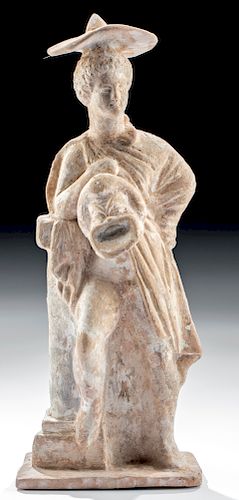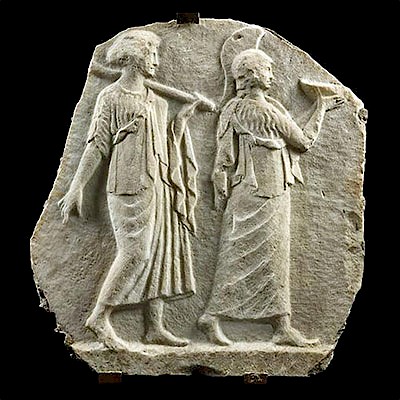Roman Terracotta Standing Figure with Actor's Mask
Lot 51
About Seller
Artemis Gallery
686 S Taylor Ave, Ste 106
Louisville, CO 80027
United States
Selling antiquities, ancient and ethnographic art online since 1993, Artemis Gallery specializes in Classical Antiquities (Egyptian, Greek, Roman, Near Eastern), Asian, Pre-Columbian, African / Tribal / Oceanographic art. Our extensive inventory includes pottery, stone, metal, wood, glass and textil...Read more
Estimate:
$2,000 - $3,000
Absentee vs Live bid
Two ways to bid:
- Leave a max absentee bid and the platform will bid on your behalf up to your maximum bid during the live auction.
- Bid live during the auction and your bids will be submitted real-time to the auctioneer.
Bid Increments
| Price | Bid Increment |
|---|---|
| $0 | $25 |
| $300 | $50 |
| $1,000 | $100 |
| $2,000 | $250 |
| $5,000 | $500 |
| $10,000 | $1,000 |
| $20,000 | $2,500 |
| $50,000 | $5,000 |
| $100,000 | $10,000 |
| $200,000 | $20,000 |
About Auction
By Artemis Gallery
Feb 13, 2020
Set Reminder
2020-02-13 10:00:00
2020-02-13 10:00:00
America/New_York
Bidsquare
Bidsquare : Exceptional Antiquities, Asian, Ethnographic
https://www.bidsquare.com/auctions/artemis-gallery/exceptional-antiquities-asian-ethnographic-4848
An important one-day auction featuring museum-worthy examples of Egyptian, Greek, Roman, Etruscan, Near Eastern, Far East / Asian, Pre-Columbian, African / Tribal, Oceanic, Native American, Spanish Colonial, Russian, Fossils, Ancient Jewelry, Fine Art, so much more! Artemis Gallery info@artemisgallery.com
An important one-day auction featuring museum-worthy examples of Egyptian, Greek, Roman, Etruscan, Near Eastern, Far East / Asian, Pre-Columbian, African / Tribal, Oceanic, Native American, Spanish Colonial, Russian, Fossils, Ancient Jewelry, Fine Art, so much more! Artemis Gallery info@artemisgallery.com
- Lot Description
Roman, Imperial Period, ca. 1st to 3rd century CE. An evocative hollow-molded terracotta statue of an actor leaning casually against a short column, his large theatre mask attached to his waist. The mask appears to be a tragic one, with an exaggeratedly sad face and sharply drawn brows. The actor wears a very dramatic petasos atop his head and a himation affixed to one shoulder. His bare legs and genitals are clear beneath the draped garment. A great deal of white pigment remains on the figure, with traces of a grey-blue low on the body and column. This figure probably graced a Roman home. Size: 2.95" W x 7.55" H (7.5 cm x 19.2 cm)
As in Greece, masks played an important role in Roman theatre. An actor's entire head and hair would be covered by a large mask of simple design, made from linen or cork, with holes for the mouth and eyes. These masks allowed audience members seated in all areas of the theatre to understand what was happening, while also amplifying the actor's voice. The Pompeiian mosaic from the House of the Tragic Poet (now in the Naples National Archaeological Museum) shows several examples of these masks including one actor wearing an example pushed up on his head. Mask motifs on decorative art speak to the power and popularity of Roman theatre.
Provenance: private East Coast, USA collection; ex-William Froelich collection, New York, USA, acquired in the 1970s
All items legal to buy/sell under U.S. Statute covering cultural patrimony Code 2600, CHAPTER 14, and are guaranteed to be as described or your money back.
A Certificate of Authenticity will accompany all winning bids.
We ship worldwide and handle all shipping in-house for your convenience.
#152857Expertly repaired and restored; this is so well done as to be almost indiscernible. Nice preservation of details, form, and some of the original pigment. Light deposits on surface.Condition
- Shipping Info
-
All shipping is handled in-house for your convenience. Your invoice from Artemis Gallery will include shipping calculation instructions. If in doubt, please inquire BEFORE bidding for estimated shipping costs for individual items.
-
- Buyer's Premium



 EUR
EUR CAD
CAD AUD
AUD GBP
GBP MXN
MXN HKD
HKD CNY
CNY MYR
MYR SEK
SEK SGD
SGD CHF
CHF THB
THB















